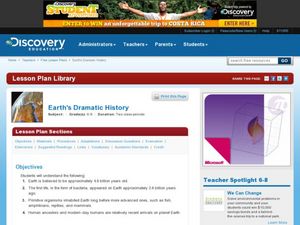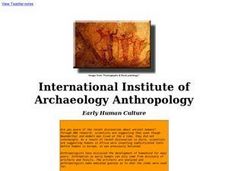Curated OER
Neanderthals
Middle schoolers study Neanderthals. For this Prehistoric life lesson, students investigate two main theories regarding the relationship between Neanderthals and modern man. Middle schoolers will conduct research through several provided...
Curated OER
Replacing Missing Links in the Evolutionary Chain
Examine the evolution of various species of hominids from their earliest existence approximately 4.5 million years ago to today. In small groups, learners research one of the ten stages of hominid evolution and then create a poster and...
Curated OER
Lesson 8: Chapter 6 (part 2) Life in the Great Ice Age
Young scholars read the assigned pages in a textbook and answer the associated questions. They write a paper based on the creationist view of origin of the Neanderthal man. They determine what is meant by a land bridge.
Curated OER
Hominid Series
Students are introduced to the human stages of evolution. They complete a series of lessons on identifying the cranial structure for various hominids, understanding the timeline involved in human evolution and investigating ancient...
Curated OER
Earth's Dramatic History
Students create a timeline. In this Earth's History lesson, students research the history of life on Earth and use the information collected to create a timeline. Students also answers the provided discussion questions.
Curated OER
International Institute of Archaeology an Anthropology
Students research early humans and their cultures. They conduct Internet research, discuss their findings with their group, evaluate the information provided by artifacts, and create a report to present to a simulated archaeology institute.
Curated OER
Early Humans
Eighth graders work together in groups to examine the earliest civilizations. After reading two stories, they compare and contrast the facts with those stories with other ones they have read. They discuss the different hypothesis on...








